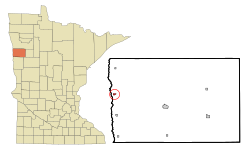Halstad, Minnesota
| Halstad, Minnesota | |
|---|---|
| City | |
| Motto: "The Way Rural America Is Supposed to Be" | |
 Location of Halstad, Minnesota |
|
| Coordinates: 47°21′5″N 96°49′32″W / 47.35139°N 96.82556°W | |
| Country | United States |
| State | Minnesota |
| County | Norman |
| Area | |
| • Total | 0.31 sq mi (0.80 km2) |
| • Land | 0.31 sq mi (0.80 km2) |
| • Water | 0 sq mi (0 km2) |
| Elevation | 873 ft (266 m) |
| Population (2010) | |
| • Total | 597 |
| • Estimate (2013) | 576 |
| • Density | 1,925.8/sq mi (743.6/km2) |
| Time zone | Central (CST) (UTC-6) |
| • Summer (DST) | CDT (UTC-5) |
| ZIP code | 56548 |
| Area code(s) | 218 |
| FIPS code | 27-26630 |
| GNIS feature ID | 0644588 |
| Website | http://www.halstad.com/ |
Halstad is a city in Norman County, Minnesota, United States. The population was 597 at the 2010 census.
A post office called Halstad has been in operation since 1884. The city was named for Ole Halstad, a Norwegian settler.
According to the United States Census Bureau, the city has a total area of 0.31 square miles (0.80 km2), all of it land.
The Highway 200 bridge that crosses the Red River was replaced in the late 1990s, after constant flooding found it under water and impassable. Directly across the Red River on the North side of Highway 200, a small pond called Grandin Lake has provided the only close example of a freshwater ecosystem that is not a river. The table top topography of this region is impressive. There are regions of the Red River that have a one-inch change in elevation per mile.
As of the census of 2010, there were 597 people, 251 households, and 139 families residing in the city. The population density was 1,925.8 inhabitants per square mile (743.6/km2). There were 306 housing units at an average density of 987.1 per square mile (381.1/km2). The racial makeup of the city was 94.0% White, 0.2% African American, 2.8% Native American, 0.8% from other races, and 2.2% from two or more races. Hispanic or Latino of any race were 4.7% of the population.
There were 251 households of which 27.1% had children under the age of 18 living with them, 43.0% were married couples living together, 10.0% had a female householder with no husband present, 2.4% had a male householder with no wife present, and 44.6% were non-families. 39.0% of all households were made up of individuals and 19.1% had someone living alone who was 65 years of age or older. The average household size was 2.23 and the average family size was 3.01.
...
Wikipedia
